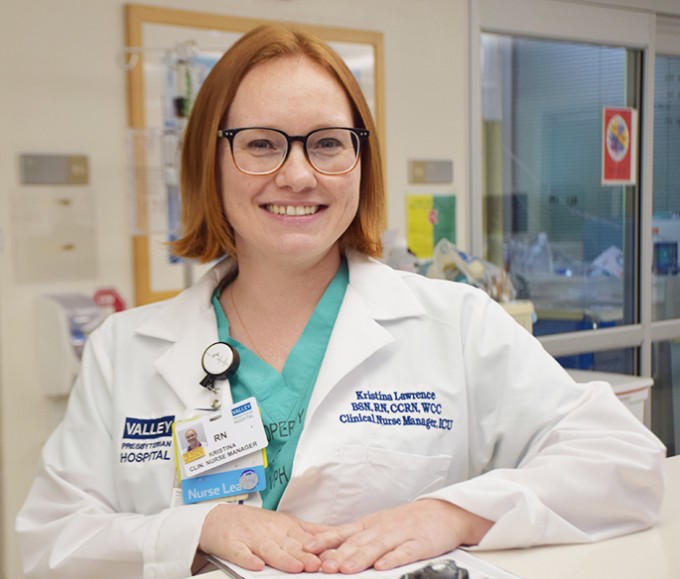My Specialty
Intensive Care Unit, Kristina Lawrence, Valley Presbyterian Hospital
Rising to the challenge of the new normal in the age of COVID-19

Kristina Lawrence, RN, BSN, CCRN, CVRN-BC, WCC
Clinical Nurse Manager, ICU
Valley Presbyterian Hospital, Van Nuys
Please tell us about the trajectory of your nursing career
My grandmother was a nurse instructor, so I basically grew up in the classroom and apparently had nursing in my blood. I worked fulltime as a unit secretary while doing my prerequisites and then attending nursing school. Once I was licensed, Valley Presbyterian Hospital essentially created a position for me in the recovery unit.
Since they didn’t have an educator in that unit at the time, I was lumped in with the new grads being trained in the ICU. So, I actually received ICU training from the start. I did recovery for three months and was then hired for an ICU position.
When there was an opportunity in nursing leadership on our unit, I was encouraged to apply, even though I still wanted to be on the floor. I spent six months in a hybrid position that was equally split between patient care and management, and was then asked to interview for the fulltime ICU clinical nurse manager position that I currently hold.
What was it like to start in ICU as a relatively new nurse?
ICU was always my thing. During my final semester in nursing school, I enjoyed an eight-week ICU rotation at a Level I trauma center, which was exciting and fast-paced.
Most of us who love ICU and ER are adrenaline junkies, but I prefer ICU because I like to have more time to get to know patients and their families. The relationships in the ER are just too brief for me. I also like to see how patients’ care evolves over the course of treatment. We often say that the ER is chaos and the ICU is organized chaos, and organized chaos is where I function best.
The scariest part about starting in ICU is not knowing what you don’t know. New grads face the constant terror of hurting someone; you don’t want to miss details that will harm the patient. That said, the nurses here were quick to jump in and take care of me when I needed it the most.
When COVID-19 broke, when did you first see signs in your ICU?
The first case to rule out for COVID was in the beginning of March. The surge happened in the beginning of April. We got hit with about four cases, and then it expanded to eight very quickly. Some weeks are very busy and then taper off, so we keep asking ourselves, “Was this the surge or just a temporary plateau?”
Tell us about protection of staff in the treatment of COVID-19
IV poles and other equipment are kept in the hallway outside the room to minimize the need for staff to enter the rooms. Our ventilators don’t have detachable screens, so we can’t run the vents from outside the room like some hospitals are doing. However, since we have to go in every two hours to turn intubated patients to prevent skin breakdown, vent care and turning are clustered.












